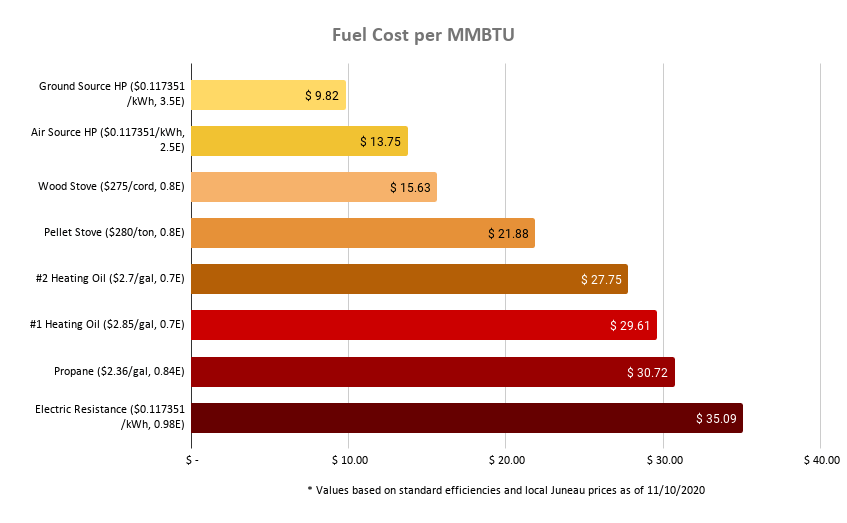What is a heat pump?
Heat Pumps are an innovative technology which can meet the heating, cooling, dehumidifying, and air filtration needs of your building. Heat Pumps are clean and efficient heating systems which use electricity to efficiently transfer heat from outdoor ambient air into your home. There are multiple types of heat pumps, and there are multiple appliances which can use heat pump technology in your home. Regardless of either, all heat pumps use a compressor to cause a refrigeration cycle and move heat.
How does a heat pump work?
Heat pumps transfer heat using a compressor, an expansion valve, and a refrigerant. Much like how a refrigerator uses a compressor and a refrigerant to cool the inside of your refrigerator or freezer, a heat pump uses the same process but in reverse for your building.
The compressor is responsible for heating the refrigerant in the refrigerant lines. At the beginning of the compression cycle, the cool refrigerant enters the compressor at a lower temperature, and it passes through the compressor. In the compressor, the cool refrigerant is heated up and turned into a high-pressure, high-temperature vapor. This vapor then is pumped into the house, and the warm thermal energy is then distributed through the house with the help of an indoor heat exchanger (a.k.a an indoor air handler).
The expansion valve is responsible for cooling the refrigerant. As the refrigerant passes through the expansion valve, the refrigerant is expanded in volume and cooled down into a low pressure, low temperature, part liquid, and vapor mixture. This low pressure, low temperature, liquid and vapor mixture is then pumped outside to the outdoor heat exchanger where it collects outdoor thermal energy. The cycle then repeats.
How can heat pumps help me save on my heating bills?
Heat pumps are extremely efficient at producing heat. Because heat pumps only transfer heat from outdoors to indoors, not create heat, they can achieve seasonal average efficiencies of up to 250% to 350%. Another way to think of this is that for every unit of electrical energy used to power a heat pump, 2.5 to 3.5 units of heat energy are produced, on average over a heating season.
This makes heat pumps much more efficient than electrical resistance heating systems, which are used with plug-in electric heaters, electric boilers, electric furnaces, or electric baseboards. Converting a building from primarily electric resistance to primarily heat pump has the potential to result in substantial energy savings with a short payback period.
For other heating systems, such as those that use fuel oil, cordwood and other fuels, the cost comparison depends on the relative cost of these fuels compared to electricity. Because each of these different fuels have different cost metrics (dollars per gallon, dollars per kWh, dollars per cord, etc), we must standardize the values to the heat content of the fuel. We use Dollars per Million BTUs of delivered heat. As shown in the graph below, air source and ground source heat pumps produce the lowest cost per million BTUs of any fuel.

How do heat pumps reduce greenhouse gas emissions?
The energy input for heat pumps is electricity, which is almost always purchased from the local utility. In communities whose electricity is primarily provided by hydropower, wind or other renewables, no greenhouse gases are created when the heat pump uses the grid electricity to operate. In Southeast Alaska and Kodiak, using heat pumps instead of heating oil or biomass will directly reduce your carbon footprint.
Fuel oil #1 and fuel oil #2 both emit around 160 lbs CO2 for each million BTUs of delivered heat or about 22 lbs CO2 per gallon of heating fuel. Additionally, biomass systems also produce CO2 as a result of combustion, however due to varying factors, standardized figures are not available. Air source heat pumps, ground source heat pumps, and electric resistance systems in communities powered by renewables produce 0 CO2 per million BTUs.
However, most of the refrigerants used to allow heat pumps to operate are potent greenhouse gases, often 1000 to 4000 times more powerful than CO2. In order for the environmental benefits of heat pumps to be realized, households must ensure that their system does not leak refrigerant, and that installers properly dispose of or reuse any replaced refrigerant. Lower GHG-potential refrigerants are being developed for residential heating systems, but these are not yet commercially available.
How could heat pumps improve your health?
Because heat pumps do not use combustion, your building’s indoor air quality will not suffer due to higher levels of particular matter, carbon monoxide, nitrogenous oxides, sulfurous oxides or black carbon. In addition, because there is not a flue pipe bringing combustion waste products outdoors, your neighborhood’s outdoor air quality will improve as well! Every year, more studies show the significant negative impacts poor air quality has on lifelong health. Switching over to heat pumps will help you and your community stay healthy.
Some heat pumps also include air filtration devices in the interior distribution units. Talk to your installer to learn more about these options.
How do heat pumps help your community?
Heat pumps help communities by reducing carbon emissions, improving local air quality, creating jobs for local heat pump installers, and encouraging the installation of local renewable energy electricity-generating resources.

